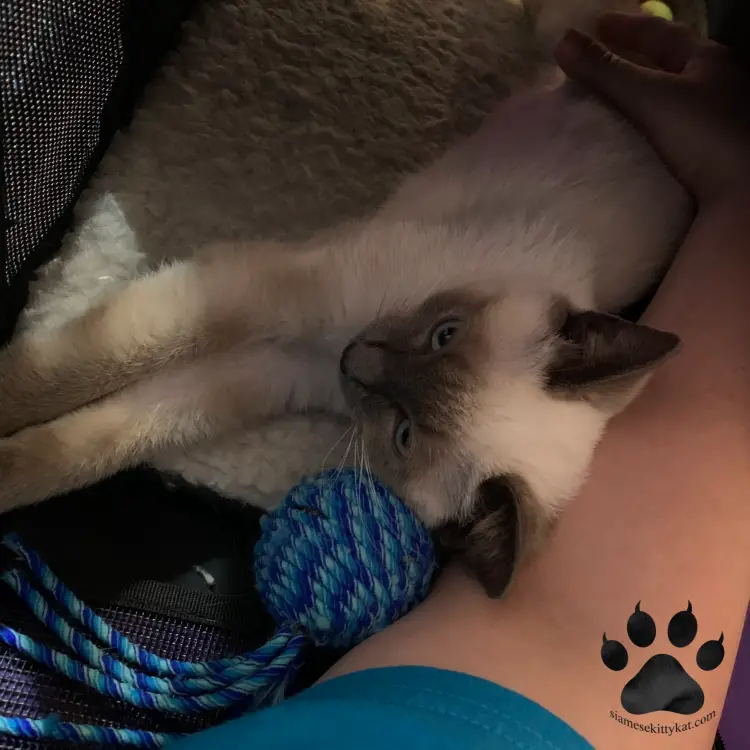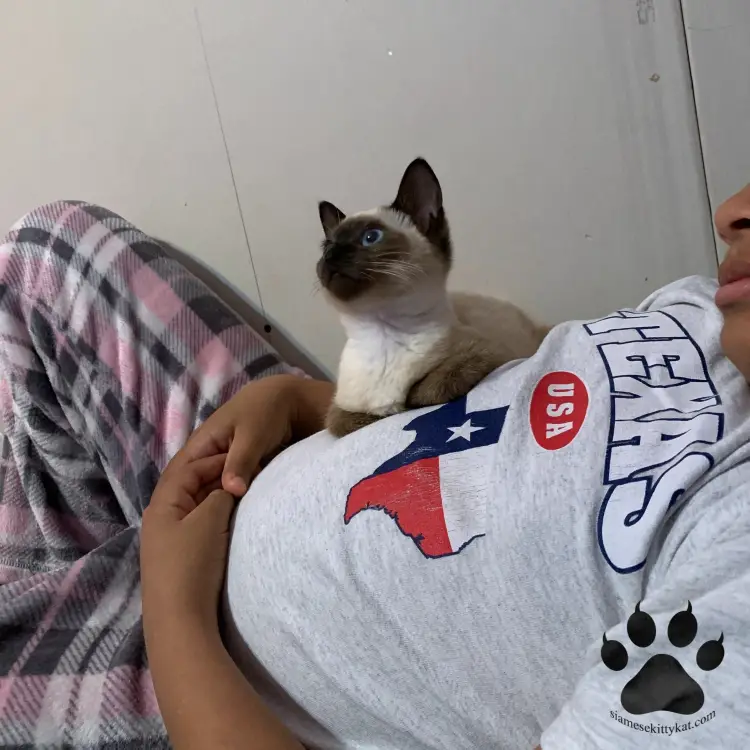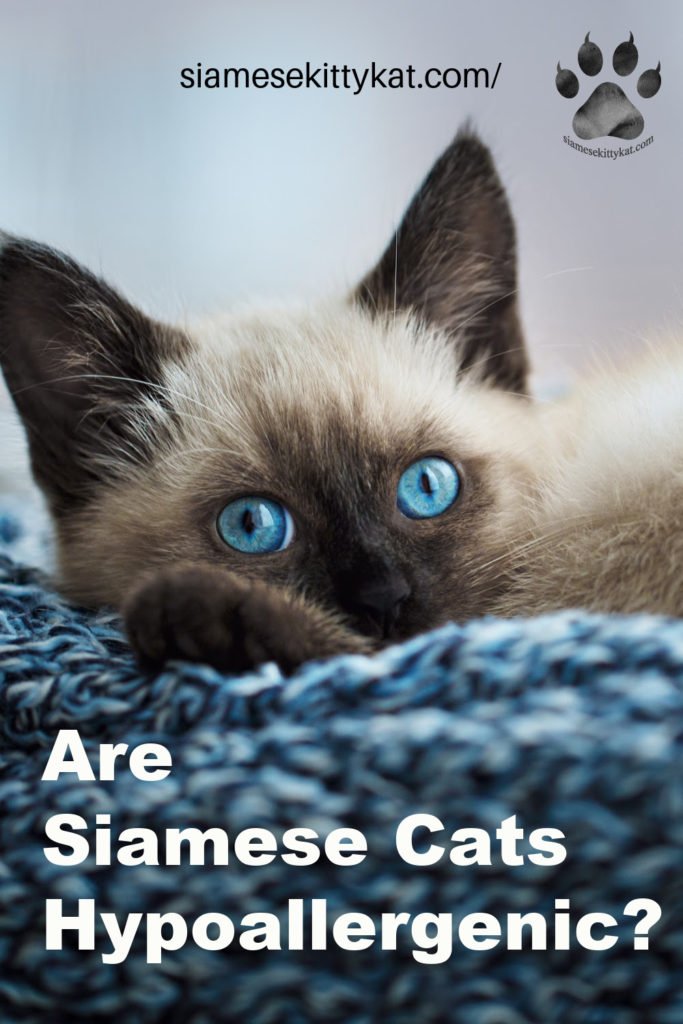Truth is, no cat is completely hypoallergenic – even the hairless ones. Although, Siamese cats are often referred to as “hypoallergenic” since they are not heavy shedders.
To understand why Siamese kitties can be a good pick for people who are allergic to cats, first, we have to understand why we’re allergic at all.
What causes cat allergies?
Allergic reactions are caused by proteins. The protein Fel D1 is an allergen found in cats’ saliva, skin, and urine. This protein is enough to trigger several side effects caused by your feline friend.
We can come into contact with this allergen when cats lick us or themselves. They can put the protein into their fur through saliva. When the saliva dries up, the protein present becomes airborne. Then, a person can easily inhale it.
When cats shed a lot, they also leave Fel D1 all over the place. Someone who is allergic can show symptoms such as hives, swollen eyes, and closed airways.
It is estimated that 10% of the population is hypersensitive to Fel D1! Thankfully, Siamese cats release less Fel D1 than most cats.
Are Siamese cats good for allergies?

Some people may experience less of a reaction when spending time with a Siamese, but it’s not certain. Even though Siamese cats produce fewer amounts of Fel D1, some people can have severe reactions to even the slightest amount. If a person has a cat allergy, no cat is “good” for them per se.
Siamese kitties also shed a lot less than other cats, making it slightly easier to avoid the allergen. Before diving into the deep end, meet with your doctor. They’ll be able to tell you how severe your allergy is. Then, it’s up to you to decide if you can manage to live with the allergy.
In general, oriental cats have less Fel D1 protein. Potential cat owners have a few choices when allergies are concerned. Since Siamese cats shed less, it also makes them an attractive option.
Can cats be hypoallergenic?
Due to such a high demand for hypoallergenic animals, many cat breeders get creative. They can charge an arm and a leg for animals marketed as hypoallergenic. Many people are willing to pay the big price tag for the chance of welcoming a furry friend into their home.
You may be surprised to hear hypoallergenic pets are a myth. All cats carry the same allergen protein, some – like the Siamese – just carry it in smaller quantities. There is no way to be sure someone won’t react to a small amount of Fel D1.
Selective breeding for less shedding is usually how “hypoallergenic” animals come about. This doesn’t mean all allergens are lost though.
How can I treat cat allergies?

People who are unfortunate enough to be allergic to felines can experience some serious reactions. These reactions can be so bad, they may end up sending you to the emergency room with breathing problems. That’s why people with allergies need to keep proper medications on hand.
Visiting your doctor will be your best bet. Depending on how allergic you are, they may prescribe you an epinephrine shot, allergy pills, or inhalers.
The best prevention is avoiding the source. But if you can’t live without a kitty in your life, or you’ve found out you’re allergic to your best friend, you can try some of these strategies:
It may be hard to do so – especially with a Siamese – but keeping one room in the house completely cat-free may be your saving grace. Having a room, such as a bedroom, office, or bathroom, where you can escape to get some fresh air will be helpful.
Here are some other things that may affect how allergic you are to your Siamese:
The Age of Your Siamese
People who adopt kittens may do well in the early stages – until they start to grow. Kittens release less Fel D1 than adult cats. Many people believe they’ve suddenly developed an allergy to cats, but that’s not the case.
It is always best to get an allergy test done before bringing a cat home. Otherwise, you may have to rehome your adorable kitten in a matter of weeks. Not only will that be sad for you, but it’ll be difficult for your pet too.
Thankfully, there are quite a few ways to overcome minor allergies.
Gender of Your Siamese
Female cats tend to emit less Fel D1 than males. If you choose a female Siamese over a male cat of another breed, you can lower your chances of having an allergic reaction.
Keep in mind female and male cats have different personalities. They also need different surgeries to avoid accidental litters.
If you’re set on a male Siamese, make sure to get him nurtured asap. A neutered male will produce less Fel D1.
Colour of Your Siamese
Cats with a lighter colored coat will fewer allergens – darker fur contains more of the protein.
If you combine all of the features together – A light female Siamese or a light neutered male Siamese – you’ll stand a better chance.
Does grooming a Siamese make them hypoallergenic?
If you groom your cat often and properly, you can help keep allergens even lower. Many cats don’t cooperate for baths – but thankfully Siamese kitties can be quite fond of water. To keep allergens low in your home, it can take up to 3 baths a week.
Siamese cats love to be near their owners. Wherever you go, they want to go too. In the bath, in the bed, on the sofa…
unfortunately it’s impossible to limit where your catwalks or sits.
Make sure to wash their blankets and bedding along with their toys in hot water once a week. It also helps to use washable covers on your furniture.
Brush your Siamese regularly. Even though Siamese cats shed less than usual, brushing often will help reduce dander. It also stops loose hairs from spreading all over the house.
So, are Siamese cats hypoallergenic?
The thing is – no animal is hypoallergenic. There are just some animals out there that trigger allergies less.
Siamese cats tend to carry less of the allergens as other cats. Due to them not being heavy shedders, they’re definitely one of the better choices for allergic cat lovers.
Make sure to always get tested before committing to being a new cat mom or dad!
Want to immerse yourself more in the captivating world of Siamese cats? I’ve got all the information you need from their distinct color points to their fun personalities: Siamese Cats: Unique Features and Personality
Get your FREE Siamese Cat 2026 Printable Calendar

